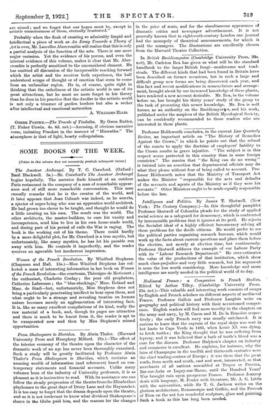From Shakespeare to Sheridan. By Alwin Thaler. (Harvard University Press
and Humphrey Milford. 21s.)—The effect of the interior economy of the theatre upon the character of the dramatic work of an age has never been thoroughly examined. Such a study will be greatly facilitated by Professor Alwin Thaler's From Shakespeare to Sheridan, which contains an amazing wealth of information (and references) based on con- temporary statements and financial accounts. Unlike many volumes born of the industry of University professors, it is as pleasant as it is instructive to read. With its assistance one can follow the steady progression of the theatrefrom the Elizabethan playhouses to the great days of Drury Lane and the Haymarket. It is too easy to forget that the drama depends upon the theatre, and so it is not irrelevant to know what dividend Shakespeare's shares in the Globe paid him, and the reasons for the changes
in the price of seats, and for the simultaneous appearance of dramatic critics and iiewspaper advertisement. It is not generally known that in eighteenth-century London one journal had the monopoly of theatrical announcements, for which it paid the managers. The illustrations are excellently chosen from the Harvard Theatre Collection.


































 Previous page
Previous page